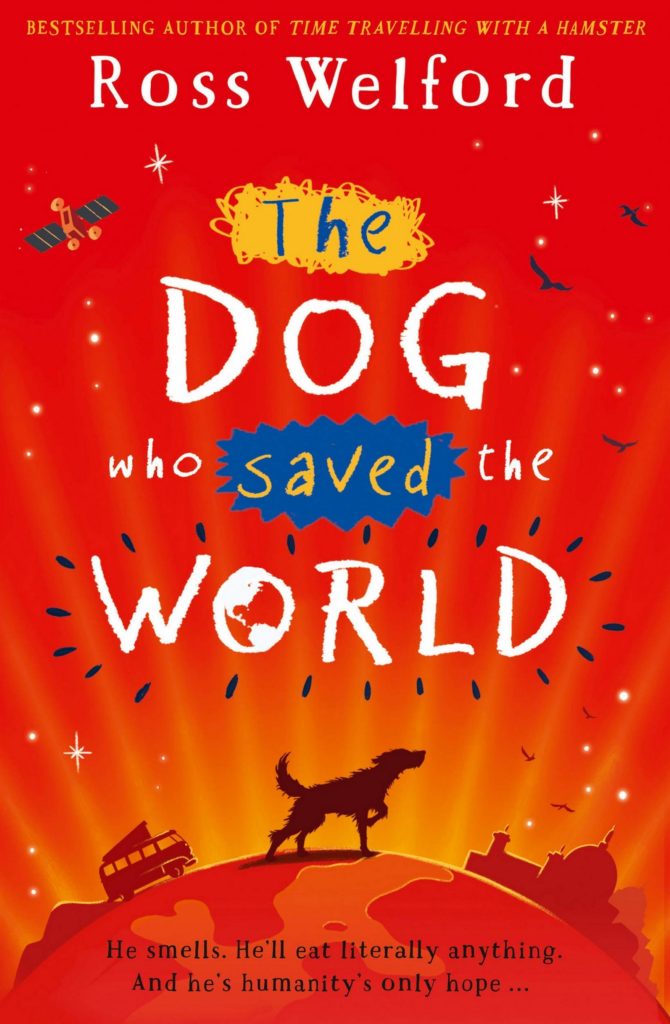Ross Welford is a children’s author, whose books include Time Travelling with a Hamster, What Not To Do If You Turn Invisible and The 1,000 Year Old Boy. Here he talks about his latest story, The Dog who Saved the World…

Can you tell us a bit about your new book The Dog who Saved the World?
The Dog Who Saved the World tells the story of 11 year-old Georgie who must travel to a virtual, 3-D future with her beloved rescue dog, Mr Mash, to bring back a cure for a deadly disease that threatens the whole of humanity. (But really – the blurb on the back of the book says it best. I can’t really improve on that!).

With references throughout the story to virtual reality, technology and experiments, what are your views about the use of technology in our lives?
I guess any technology can be both good and bad, which is hardly an original observation. From a writer’s point of view, I find one of the biggest challenges is mobile phones. Kids aged about eleven, which I write about, very often have their own phones and they could be used to get characters out of trouble far too easily! Other technology (like time machines, or 3-D VR) I can just make up and, because I’ve made it up, it’ll do exactly what I want it to.
What inspired this particular story?
The Dog Who Saved The World was not “inspired” by any particular event or thought (See “Where do you get your ideas from?” below). Instead it grew by lots of thinking. It was originally a story about a girl who gained the power of precognition, but it developed into something very different.
What does a day in the life of Ross Welford look like when you’re writing?
My writing days don’t really have a pattern. I try to avoid things like rituals. I’m quite poorly-disciplined, though so I’ll often set myself a daily word target: it’s good way of getting through a difficult first draft. The dog always needs walking and I find I often turn over ideas in my head on a walk. Other than that, there’s lots of tea to be drunk, and I take breaks by practising the piano.
This slideshow requires JavaScript.
Do you have a favourite part of the writing process?
My favourite part of the writing process: typing THE END. Everything else is far too much like hard work.
As a teacher, I’m always interested in an author’s point of view about inspiring a love of reading and writing in our children…
What are your earliest memories of reading and writing?
I read lots of comics. My parents allowed me to choose a comic to be delivered every week, and the first I remember was Topsy & Tim. I could read well by the time I started school and by age six or seven I had devoured most of The Secret Seven books by Enid Blyton.
Children are always fascinated by authors and seem to always want to know where they get their ideas from. So, on behalf of all the children I’ve ever taught, where do you get your ideas and inspiration from?!
If there’s one question that makes writers’ hearts sink, it is “Where do you get your ideas from?” That’s because the only honest answer is “I don’t know”. We come up with so many convoluted answers to that question, but they’re all just stories to avoid having to tell the truth, which would disappoint. Stephen King says that’s why writers like other writers’ company: because they never ask that question! The only thing I could add is that perhaps writers think more, and use their imagination more, because we have to: it’s our job. But an idea never arrives fully formed – at least it never has for me, sadly.
What advice would you give to any budding young authors?
Get to the end, and then go back to the beginning and rewrite it. As Roald Dahl said, “Good writing is essentially rewriting”. Your writing will improve massively if you accept that the first thing that appears on the page is not always the best thing.
Finally, can you describe your new book The Dog who Saved the World in three words?
Funny, exciting, moving. (I hope!)


